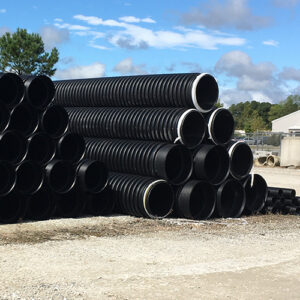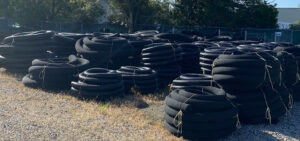 When it comes to durable, efficient drainage and utility systems, corrugated pipe stands out for its strength, flexibility, and cost-effectiveness. Whether you’re dealing with stormwater runoff, underground cabling, or a complex wastewater setup, choosing the right type of pipe can make or break your project’s success. But corrugated pipes are not the same.
When it comes to durable, efficient drainage and utility systems, corrugated pipe stands out for its strength, flexibility, and cost-effectiveness. Whether you’re dealing with stormwater runoff, underground cabling, or a complex wastewater setup, choosing the right type of pipe can make or break your project’s success. But corrugated pipes are not the same.
Let’s walk through what corrugated pipe is, its purpose, and why it continues to gain popularity in construction, agriculture, and infrastructure.
What Is Corrugated Pipe and How Does It Work?
Corrugated pipe refers to a type of plastic piping made with a ribbed exterior and typically a smooth interior. This dual-layer structure—especially in double-wall models—allows the pipe to handle external pressure while promoting smooth flow inside. Most often made from high-density polyethylene (HDPE), this type of pipe is both lightweight and highly resistant to corrosion, which explains its wide usage in demanding environments.
Why It’s a Better Choice Than Traditional Materials
Meanwhile, traditional concrete or metal pipes are much heavier and often more expensive to install. In contrast, corrugated pipe offers a long-lasting solution without sacrificing structural integrity. Thanks to its lightweight design, it’s easier to transport, quicker to install, and more adaptable to irregular terrain.
Another advantage is its resistance to chemicals and moisture. In areas where soil quality or weather conditions vary dramatically, this flexibility becomes critical.
Single-Wall vs. Double-Wall Corrugated Pipe
Also, it’s important to understand the difference between single-wall and double-wall designs. Single-wall pipes are lightweight and flexible, often used in light-duty applications like agricultural drainage or cable protection. On the other hand, double-wall corrugated pipe offers greater strength and a smooth interior that improves fluid flow. This makes it ideal for stormwater systems, culverts, or any underground infrastructure that needs to handle high pressure or heavy loads.
Your selection should depend on what the system needs to carry, how deep the pipe will be buried, and how much traffic or weight the area must support.
Common Uses of Corrugated Pipe
 Furthermore, the beauty of corrugated pipe in Little River SC lies in its versatility. They are important in nearly every industry:
Furthermore, the beauty of corrugated pipe in Little River SC lies in its versatility. They are important in nearly every industry:
- Stormwater Drainage: Used to manage runoff from roads, parking lots, or buildings
- Wastewater Systems: Great for sewage lines and treatment plant setups
- Utility Protection: Acts as conduit for electrical cables and fiber optics
- Culverts and Crossings: Allows water to pass beneath roads, trails, or railways
- Agricultural Drainage: Helps prevent waterlogging in crop fields and pasture land
Because it performs well in both shallow and deep installations, it suits many long-term drainage applications without needing frequent maintenance.
How to Choose the Right Corrugated Pipe for Your Project
So, start by thinking about the size. Will your system require high flow capacity? Then, your best bet is a larger diameter pipe. For lighter uses like landscaping or garden drainage, a smaller, more flexible pipe may be just fine.
Next, consider the material. While HDPE is the most common due to its durability, polypropylene or PVC can also be options for specific use cases. Ask about UV protection if the pipes get exposure to sunlight, and be sure to match the joint type to your installation environment. Bell-and-spigot, snap, or gasketed joints all offer different levels of sealing and ease of assembly.
And don’t forget to check compliance with industry standards. Look for ASTM or equivalent certifications to ensure the pipe performs as promised.
Long-Term Performance and Installation Ease
Another reason contractors favor corrugated pipe is that it performs well under various conditions. Its annular or helical corrugation patterns help maintain shape even under pressure. That means it won’t crush easily under heavy soil or surface traffic.
In cold climates, the pipe holds up against frost heaving and temperature changes. In hot climates, it resists UV damage and internal scaling. Best of all, it lasts—most HDPE corrugated pipe installations have a service life of 50 years or more.
Why It’s an Environmentally Smart Option
Because HDPE and similar materials are recyclable, corrugated pipe offers a more sustainable solution than concrete or metal alternatives. It also doesn’t corrode, doesn’t leach chemicals, and doesn’t promote bacterial buildup inside. Over time, this contributes to better water quality and fewer system blockages.
Kidd Construction Supply adds value, offering expert guidance, tailored recommendations, and reliable supply options for contractors and property owners looking to install long-lasting, high-performance corrugated pipe systems.
Call Kidd Construction Supply now to get help selecting the right corrugated pipe for your next drainage or utility project. Whether you’re managing stormwater, protecting cables, or building underground infrastructure, you’ll get the performance and durability your site demands.
Like us on Facebook
Kidd Construction Supply
1057 Redi Mix Rd
Little River, SC 29566
(843) 399-1515
https://www.kiddconstructionsupplies.com/
Areas Served:
Carolina Forest, Little River, Myrtle Beach, North Myrtle Beach
